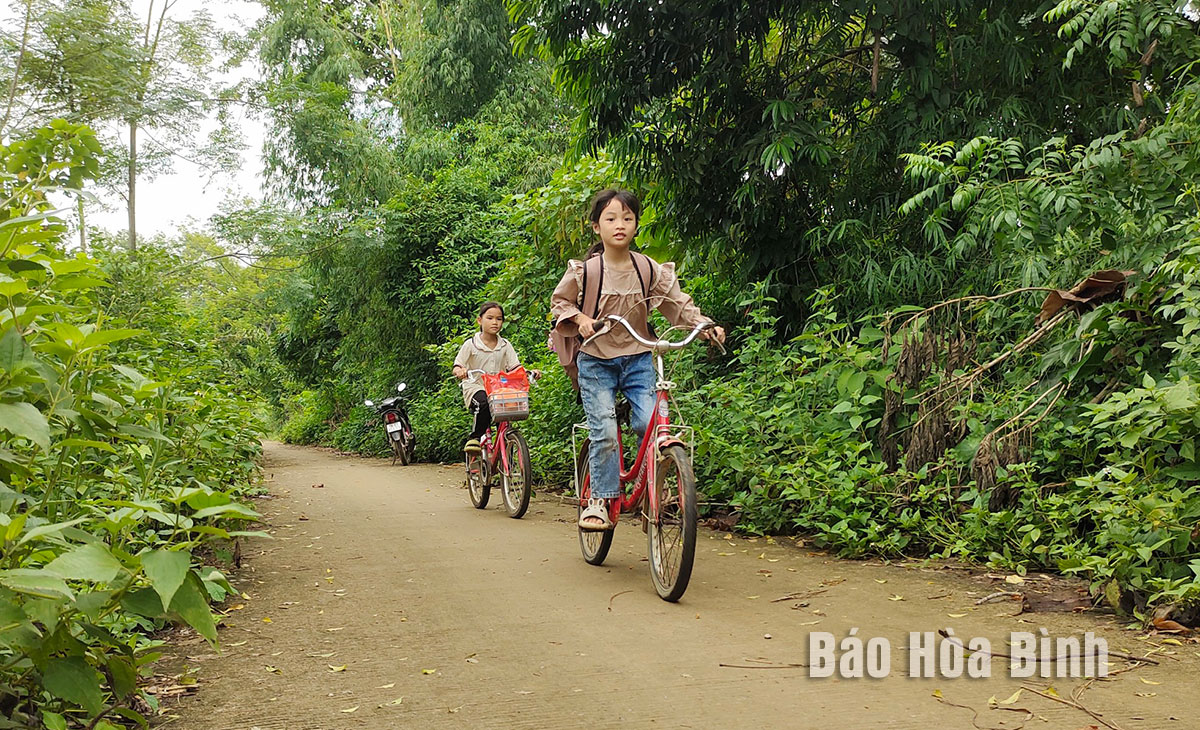
According to the report of the People's Committee of Lac Son district, implementing Sub-project 1 (Project 4) on investing in the essential infrastructure to serve production and life in the ethnic minority and mountainous areas, the total capital plan assigned by the Central budget to the district is nearly 110 billion VND.

In recent years,
the essential infrastructure in Lac Son district has been increasingly invested
and improved. The photo: The road inside Ong Man hamlet, Chi Dao commune.
From 2019 until
now, the district has disbursed over 80.5 billion VND, reaching 73.2% of the
assigned capital plan.
Accordingly, the
District People's Committee has invested in new construction, upgrading and
repairing 54 works, including building and upgrading 32 traffic works; 5
infield road and irrigation projects; 1 central market in Binh Hem commune; 1
auxiliary item for the central stadium of My Thanh commune; newly building,
repairing and upgrading 15 cultural houses and community houses; Non-business
capital to carry out the renovation and maintenance of 332 projects with a
total investment of nearly 8.5 billion VND.
Thereby, it
helps clearly improve almost all aspects of socio-economic life in the ethnic
minority and mountainous areas in the district.
Hoa Binh province is undergoing a dynamic transformation amid Vietnam’s national digital transition. Building on Poliburo’s Resolution No. 57-NQ/TW on breakthroughs in science, technology, innovation, and national digital transformation, the province has rolled out a wide range of practical action plans. A standout initiative is the "Digital Literacy for All” movement, an effort to ensure that no one is left behind in the digital era.
Hoa Binh province is undergoing a dynamic transformation in the wake of the national digital transformation movement. Building on Resolution No. 57-NQ/TW of the Politburo on breakthroughs in science, technology, innovation, and national digital transformation, the province has implemented a wide range of practical action plans. A standout initiative is the "Digital Literacy for All” movement ambitious effort to ensure that no one is left behind in the digital age.
With a spirit of unity and proactive problem-solving, the Party Committee, the government and the people of Dong Lai Commune (Tan Lac District) have made great strides in implementing the resolutions of the 24th Party Congress of the commune for the 2020 - 2025 term. Focusing on leadership and practical actions, the commune has brought the Party’s resolutions into daily life, creating strong impacts and pushing the local development forward.
Amid the nationwide push for digital transformation, young people in Hoa Binh Province are stepping up as dynamic pioneers, applying technology to enhance Youth Union operations and expand the reach of youth-led initiatives. Through creativity and adaptability, Youth Union organizations at all levels have introduced a series of practical solutions, contributing to modern governance and community development.
In recent years, An Nghia commune, located in Lac Son district, has stepped up administrative reform, focusing on improving the quality and efficiency of its single-window service unit for receiving and processing administrative procedures. These improvements have helped create favourable conditions for local residents and organisations to handle administrative procedures, contributing to the commune’s broader socio-economic development.
The Prime Minister-approved master plan to develop the multi-use value of forests ecosystems through 2030, with a vision to 2050, aims to improve the management and sustainable use of forest resources, create jobs, increase incomes, and improve the living standards of ethnic minorities, people in mountainous and remote areas, forest workers and those living near forests.



